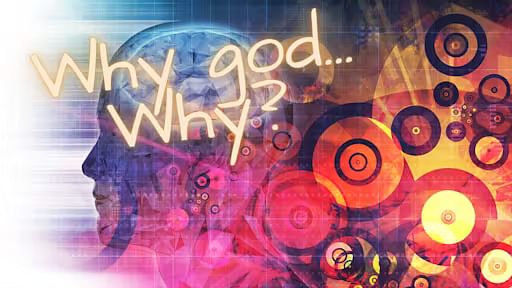
When I observe reality, I use my perceptions to see, touch, taste, smell, and hear via my sensory organs receiving stimuli from my surroundings. The stimuli are converted by sensory organs into electrical signals that are then sent to specific areas of the brain for processing into the magnificent live action broadcast I experience every waking moment and even during sleep via dreams. I have no need to attribute anything I perceive to anything supernatural. It all makes sense to me, how and why my brain works and how it interprets reality.
Granted, it's not as simple as I implied. The brain is not simple. The sensory organs are quite complex, as are their functions and processes. As an example, the sensory organs transmit huge amounts of data every second (~11 million bits per second), but you are only ever made aware of a fraction of that data (~50 bits per second). The brain handles most of the data in a process called unconscious bias, and you are completely isolated from it. However, what your brain does and doesn't let you be consciously aware of helps shape every aspect of how you perceive, what you believe, and how you respond to the world.
Without your help.
I do not believe in a god. I am uncompelled by any evidence claimed by believers due to what I feel are primarily extreme cases of confirmation bias. The source material, ancient texts and stories, are a mess and are almost completely incongruent with reality. I also feel it is extremely questionable and almost perverse to attribute anything natural to something purely speculative as well as supernatural and outside of objective reality, on nothing more than claims originating in ancient myths. There has never been a moment in my life that I've felt that I needed a comforting belief to blanket me from reality, including the realization that I will die. I will cease to exist at some point and that is a fact. As Jim Morrison so poignantly sang, "Five to one, baby. One in five. No one here gets out alive." Can I prove that there is no god? Of course not. It's fundamentally unfalsifiable. I can dismiss the idea with prejudice, however, because there is no data to support the claim that there is an existent, necessary, supernatural deity.
What about those who do believe? Why do they believe in something they can not objectively prove to be real? Why do they perceive the world as miracles and godly action, when I see nature and natural processes and understand how I'm able to perceive it in the first place? What about the ancient myths captivate them so much that they base their entire lives, often in a detrimental way, on the scribblings of an iron age cult? Let us explore.
As social groups grew, they would also have become more complex. This would naturally lead to more and more complex ideas. Their supernatural beliefs would have also had to adapt to this increasing complexity and to cover ever-changing dynamics. This could include things like plants and animals that do harm, events in nature such as storms or volcanos, and the means to explain the rest of the world around them, including the big one: death. Fear of death is largely ubiquitous among humanity and is reflected in mythologies past and present. All of this would ultimately culminate into lessons passed along as stories. These stories would become the framework to warn of dangers and to govern the actions of the social group in an effective and efficient way. The stories would also begin to encompass speculations as to why things exist, why things are the way they are, and why things happen. Once again, as the people evolved socially and intellectually, these stories would have to evolve as well, and become more elaborate and comprehensive to meet the demands of greater understanding. And so repeats the cycle through countless generations.
These ideas, produced by social groups functioning under a government consisting primarily of supernatural beliefs, would at some point go from spoken to written languages, further solidifying beliefs and potentially widening the audience. Since the stories about the supernatural agents and rules thereof were the societal glue, these would be the first things people wrote about, followed by bureaucratic rules, and then other ideas and observations. The supernatural stories would be passed down orally for untold millennia prior to the development of formal writing around 5400 years ago, so they were already well developed and rich in detail. The Sumerians didn't develop writing and then start making up stories. They were just etching their existing stories in stone -- or clay to be more specific.
I find it interesting that religious people sometimes understand evolution as well as the fact that artifices of the past may no longer apply... which is reinforced by the evolution of all beliefs themselves. Yet they refuse to even consider abandonment of antiquated ideology and instead attempt to continue the tradition of revision in light of damning evidence. There also remains a consistent and illogical refusal to acknowledge that mythologies and religions arose as agents of control, as primitive laws and morals, and have only propagated themselves so well, and have been sold as fundamental truths, due to being necessarily intertwined with our history and, more fundamentally, our social and cognitive evolution. These meme modules were installed so long ago and, given their obvious social advantages, is mostly why they still remain, even given an increased understanding of not only our planet, but of the fundamental properties of the universe as well. Instead of accepting new facts and information, however, believers attempt to combine it with incompatible beliefs from an age of misunderstanding and ignorance.
There are a great number of religious people who honestly feel they've arrived at religious belief after critically evaluating facts and data. This is not supported by logic, because if true, all people and religions would have eventually arrived at the same answer. On the rare occasion, I think their mistaken notion that they did due diligence may be an honest error in judgment, but I also feel it may have been radically misguided and less than thorough. I can respect that some effort was made to understand the information available, however peripheral that may or may not have been. This is not the case for the overwhelming majority, even given as vehemently as the majority will insist it is. They are almost ubiquitously unaware of their biases. Most of the time, the effort consists of working backward from a pre-existing assumption implanted via memes and early childhood indoctrination where religious thinking is installed at a prime developmental stage by primary caregivers. It is terribly effective, as well as insidious and reprehensible.
The social and personal acceptance received when participating in religious services and activities is seen by many as another reason for maintaining mythological tradition. In fact, many religious theatrics are purposefully designed to appeal to the parishioners and congregations in an effort to create a sense of belonging that attempts to directly reflect a sense of family. The mythology is applied in parallel, to install the notion that family and religious congregations are analogous, if not synonymous. That is why so much stress is put on family values, and also to stress that religion is necessarily the source of family values and morality. However, that is dismissing the fact that others who have fine family values do not share the same religion; and of course this also applies to those lacking any religious beliefs altogether. While it may true that the believers depend on mythological agency for their family values, even though the myths often contradict our modern understanding of values and morality, it is certainly not universally true.
Lastly, fear of the unknown and, perhaps most importantly, death, is a major factor for closely held religious beliefs. Even more ubiquitous than seeking answers to origins, people want assurances of a life after death. It is incomprehensible to people to not exist and we cannot ever truly know what happens at death, even given the phenomena of near death experiences. These accounts are always anecdotal and only sometimes similar, likely through expectations created by cultural memes. The psychology of expectation is fascinating and comprehensive but basically boils down to the fact that our brains use predictive coding in the form of expectation to drive our perceptions. Regardless, most people fear death. Realistically, it has been proven that you don't come back. One more time: You are not coming back. So what happens, when you die, to this magical consciousness that you've been so fortunate to develop? The fact you have to die to find out is why nobody, scientific or religious, can know with absolute certainty. The data seems to suggest that the answer is simply that it ends.
There are other reasons and psychological nuances that attract religious thinking, to be sure. Enough to fill a manuscript. I feel that the ones discussed here are simply primary examples and I certainly cannot encompass the entire body of this subject in this limited space. At their core, religions aspire to be about something good. Giving hope. Comforting the dying as well as the bereaved. Keeping people from committing crimes (although, the thought that one would otherwise commit crimes without religion speaks volumes of their moral character). In my mind, and reality often agrees, religion will never be more than an artifact of evolution and a comforting lie affronting what are sometimes uncomfortable truths. It is not right to claim to hold absolute truth when you simply cling to a myth. I'm okay being uncertain of things when there is no data, when the problem is unresolved, and with my own mortality.
"God" is an unnecessary agent, and inhibits forward progress in many cases, as it is often required to surrender your own agency, societal consideration, and intellectual honesty, in favor of an assertion made in antiquity when humans were largely ignorant of the nature of our planet and completely ignorant of the universe at large. It's everyone's right to believe what they want so long as it doesn't interfere in any way with the same right of someone else, even if it is, sadly, just a comfortable lie. Fortunately, it's not free from critique and analysis, as well as ridicule when deserved.





